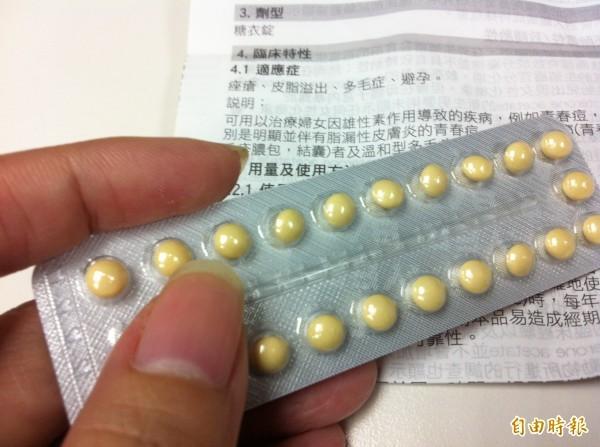Emergency contraceptive pills would continue to require a doctor's prescription for the time being, the Food and Drug Administration (FDA) said on Thursday, after a multi-stakeholder meeting the same day failed to reach a consensus over whether to reclassify the drug as over-the-counter medication.
The FDA invited representatives from the Ministry of Education, the Department of Gender Equality, civil society groups, the pharmaceutical industry and other groups to discuss the potential relaxation of rules governing the so-called "morning-after pill."
However, opinions were divided as to whether to reclassify emergency contraception to enable it to be available for purchase at pharmacies without a doctor's prescription — which is currently required.

Photo: Hung Su-ching, Taipei Times
Speaking in support of deregulation, pharmacist Li Yi-hsuan (李懿軒) from the Federation of Taiwan Pharmacists Associations said that the WHO recommends making emergency contraception available as a backup when regular contraception fails.
"Eighty percent of developed countries" — including the US, the UK and Australia — have already reclassified emergency contraceptive pills as over-the-counter medication, Li said.
The Taipei Women's Rescue Foundation said that "emergency contraceptive pills are not high-risk medication" and greater availability would "protect women from the risk of forced or unexpected pregnancy, and safeguard their bodily and reproductive autonomy."
Speaking in opposition to the proposal, Taiwan Association of Obstetrics and Gynecology secretary-general Huang Jian-pei (黃建霈) said that emergency contraceptive medicine could "lead to problems if used without understanding the risks."
Huang, who is director of the Department of Obstetrics and Gynecology at MacKay Memorial Hospital, cited an example of a woman who mistook abnormal vaginal bleeding as her menstrual period.
She died from a ruptured ectopic pregnancy after taking emergency contraception because she "had not taken the bleeding seriously," he said.
FDA Deputy Director-General Wang Der-yuan (王德原) said after the meeting that the discussion involved social science, natural science and human rights considerations, and that "there is no zero-risk decision."
The issue of whether to reclassify emergency contraception had been raised as early as 2016 by the FDA, but the proposal was shelved due to a social backlash at the time.
On Tuesday, Taiwan People's Party Legislator Lin Yi-chun (林憶君) called for emergency contraceptives to be changed from prescription drugs to over-the-counter medication.
"An online survey in 2024 found that 65 percent of [respondent] women supported making it available," Lin said at the legislature in Taipei.
Premier Cho Jung-tai (卓榮泰) said that he had already asked Minister of Health and Welfare Chiu Tai-yuan (邱泰源) to coordinate with the medical community to reach a consensus as soon as possible on the issue.

Taiwan is stepping up plans to create self-sufficient supply chains for combat drones and increase foreign orders from the US to counter China’s numerical superiority, a defense official said on Saturday. Commenting on condition of anonymity, the official said the nation’s armed forces are in agreement with US Admiral Samuel Paparo’s assessment that Taiwan’s military must be prepared to turn the nation’s waters into a “hellscape” for the Chinese People’s Liberation Army (PLA). Paparo, the commander of the US Indo-Pacific Command, reiterated the concept during a Congressional hearing in Washington on Wednesday. He first coined the term in a security conference last

Prosecutors today declined to say who was questioned regarding alleged forgery on petitions to recall Democratic Progressive Party (DPP) legislators, after Chinese-language media earlier reported that members of the Chinese Nationalist Party (KMT) Youth League were brought in for questioning. The Ministry of Justice Investigation Bureau confirmed that two people had been questioned, but did not disclose any further information about the ongoing investigation. KMT Youth League members Lee Hsiao-liang (李孝亮) and Liu Szu-yin (劉思吟) — who are leading the effort to recall DPP caucus chief executive Rosalia Wu (吳思瑤) and Legislator Wu Pei-yi (吳沛憶) — both posted on Facebook saying: “I

Sung Chien-liang (宋建樑), who led efforts to recall Democratic Progressive Party (DPP) Legislator Lee Kun-cheng (李坤城), was released on bail of NT$80,000 today amid outcry over his decision to wear a Nazi armband to questioning the night before. Sung arrived at the New Taipei District Prosecutors’ Office for questioning in a recall petition forgery case last night wearing a red armband bearing a swastika, carrying a copy of Adolf Hitler’s Mein Kampf and giving a Nazi salute. Sung left the building at 1:15am without the armband and covering the book with his coat. Lee said today that this is a serious

The Ministry of Economic Affairs has fined Taobao NT$1.2 million (US$36,912) for advertisements that exceed its approved business scope, requiring the Chinese e-commerce platform to make corrections in the first half of this year or its license may be revoked. Lawmakers have called for stricter enforcement of Chinese e-commerce platforms and measures to prevent China from laundering its goods through Taiwan in response to US President Donald Trump’s heavy tariffs on China. The Legislative Yuan’s Finance Committee met today to discuss policies to prevent China from dumping goods in Taiwan, inviting government agencies to report. Democratic Progressive Party Legislator Kuo Kuo-wen (郭國文) said